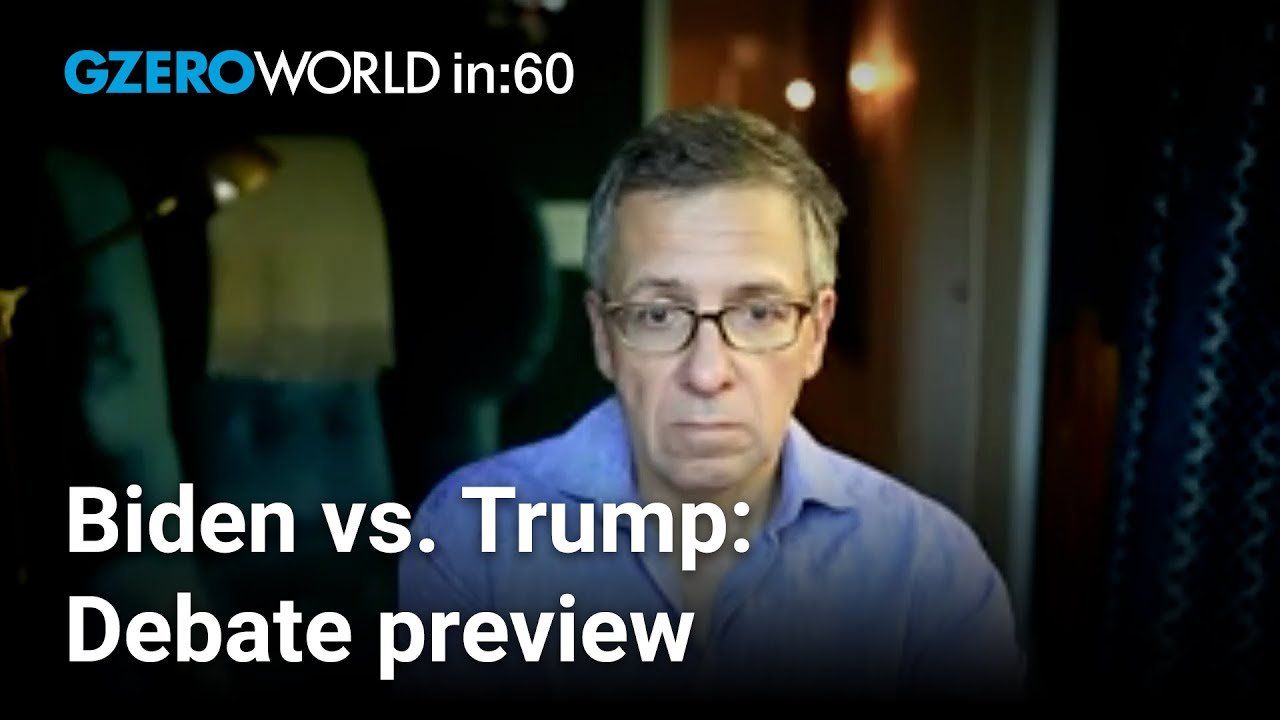Ian Bremmer shares his insights on global politics this week on World In :60.
What do you expect from the first Trump-Biden debate?
Well, I'm going to be watching it. I am a little surprised it's happening, that they agreed on the rules which are more favorable to Biden and to so-called normal politicians. But, you know, we'll see. I think there's a lot more downside for Biden precisely because his age is perceived to be so much more of a problem. The State of the Union, he did very well. But this is a live-fire exercise. It's not a set piece. And so in that regard, there's more ways you can go badly. Having said that, if he's able to stand his ground, and if Trump seems like he's slobbing more, this is a lot more about how they appear than what they actually say. You hate to say that something is important as US presidential race, but of course, that is a lot of what American politics, especially the elections, are about.
With formal EU membership talks beginning, is Ukraine closer to accession?
Yeah. I mean, every step you can take, it's a long process. It is absolutely making it easier for the Ukrainians to actually get in. But let's keep in mind there's a lot of uncertainty out there. First of all, with French elections coming up soon, if it turns out that Le Pen's National Rally party gets a majority. Hung parliaments more likely, but if it gets a majority, she could shut down, lots of components of EU accession talks, which would include Ukraine. The Parliament would no longer support additional movement and that's a problem. You need all 27 states to allow this to go through. And France is in a position where that might be the case. Also if Trump wins in the US, keep in mind Trump does not support a strong united EU. He wants further exits. He wants a weak EU to the extent that that gives space for people like Orbán and other European members that are more skeptic to oppose accession, it could get more challenging. So, I don't think this is a done deal by any means.
China just brought back rocks from the far side of the moon. The first time that's happened. Are we in a new Space Race?
Well, we are in the sense that the Chinese care a lot about having more capacity in space for scientific achievement, for national pride and also for national security. But still, if you look at the number of satellites that are up there, I mean, you know, the United States is nine times, so 900% greater. That's a pretty big deal. And that is not NASA. That is the private sector in the US. It is Elon and SpaceX. It is Jeff Bezos. It's other companies. And the fact that the entrepreneurship in the U.S has allowed American space exploration to grow, which NASA can fund and the Pentagon can fund and take advantage of, has been a huge advantage for the US.
Doesn't mean they're all and always aligned with American national security, but it's certainly not a space race versus the Chinese.
- Ukraine on the path to joining NATO, says deputy Mircea Geoanǎ ›
- Ukraine accepts EU trade restrictions to appease Poland ›
- The one good reason to watch the Biden-Trump debates ›
- Trump vs. Biden: Let’s get ready to rumble ›
- All eyes on the Biden-Trump debate ›
- Debate Bingo: Welcome to the 2024 Biden-Trump showdown - GZERO Media ›
- Ian Bremmer on debate: A big loss for Biden - GZERO Media ›
- With Biden out, can Kamala Harris defeat Trump? - GZERO Media ›
More For You
China was largely absent from the core conversations at the 2026 Munich Security Conference. That, says Ian Bremmer, is telling.
Most Popular
At the 2026 Munich Security Conference, Brad Smith announces the launch of the Trusted Tech Alliance, a coalition of global technology leaders, including Microsoft, committing to secure cross-border tech flows, ethical governance, and stronger data protections.
When the US shift from defending the postwar rules-based order to challenging it, what kind of global system emerges? CFR President Michael Froman joins Ian Bremmer on the GZERO World Podcast to discuss the global order under Trump's second term.
TODAY at 12 pm ET: Watch our Global Stage live premiere from the Munich Security Conference
Tune in today at 12pm ET/6pm CET for the live premiere of our Global Stage from the 2026 Munich Security Conference, where our panel of experts takes aim at the latest global security challenges. NY Times National Security Correspondent David Sanger moderates the discussion with Benedetta Berti, Secretary General, NATO Parliamentary Assembly; Ian Bremmer, President & Co-founder, Eurasia Group & GZERO Media; Dr. Wolfgang Dierker, Global Head of Government Affairs, SAP; and Brad Smith, Vice Chair & President, Microsoft.
